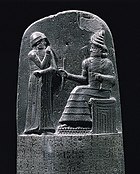 09-03-2009, 03:25 PM
09-03-2009, 03:25 PM
|
#268
|
|
Unfrozen Caveman Lawyer
Join Date: Oct 2002
Location: Crowsnest Pass
|

I select in the Political Leader category, HAMMURABI:
We learned about Hammurabi in our Legal History course.
 http://en.wikipedia.org/wiki/Hammurabi
Hammurabi (Akkadian from Amorite ˤAmmurāpi, "the kinsman is a healer," from ˤAmmu, "paternal kinsman," and Rāpi, "healer"; (ca. 1728 – 1686 BC middle chronology) was the sixth king of Babylon. He became the first king of the Babylonian Empire, extending Babylon's control over Mesopotamia by winning a series of wars against neighboring kingdoms.[1] Although his empire controlled all of Mesopotamia at the time of his death, his successors were unable to maintain his empire.
Hammurabi is known for the set of laws called Hammurabi's Code, one of the first written codes of law in recorded history. These laws were written on a stone tablet standing over eight feet tall (2.4 meters) that was found in 1901. Owing to his reputation in modern times as an ancient law-giver, Hammurabi's portrait is in many government buildings throughout the world.
Hammurabi is best known for the promulgation of a new code of Babylonian law: the Code of Hammurabi. This was written on a stele, a large stone monument, and placed in a public place so that all could see it, although it is thought that few were literate. The stele was later plundered by the Elamites and removed to their capital, Susa; it was rediscovered there in 1901 and is now in the Louvre Museum in Paris. The code of Hammurabi contained 282 laws, written by scribes on 12 tablets. Unlike earlier laws, it was written in Akkadian, the daily language of Babylon, and could therefore be read by any literate person in the city.[20]
The structure of the code is very specific, with each offense receiving a specified punishment. The punishments tended to be harsh by modern standards, with many offenses resulting in death, disfigurement, or the use of the "Eye for eye, tooth for tooth" (Lex Talionis "Law of Retaliation") philosophy. Putting the laws into writing was important in itself because it suggested that the laws were immutable and above the power of any earthly king to change.[citation needed] The code is also one of the earliest examples of the idea of presumption of innocence, and it also suggests that the accused and accuser have the opportunity to provide evidence. However, there is no provision for extenuating circumstances to alter the prescribed punishment.
http://en.wikipedia.org/wiki/Hammurabi
Hammurabi (Akkadian from Amorite ˤAmmurāpi, "the kinsman is a healer," from ˤAmmu, "paternal kinsman," and Rāpi, "healer"; (ca. 1728 – 1686 BC middle chronology) was the sixth king of Babylon. He became the first king of the Babylonian Empire, extending Babylon's control over Mesopotamia by winning a series of wars against neighboring kingdoms.[1] Although his empire controlled all of Mesopotamia at the time of his death, his successors were unable to maintain his empire.
Hammurabi is known for the set of laws called Hammurabi's Code, one of the first written codes of law in recorded history. These laws were written on a stone tablet standing over eight feet tall (2.4 meters) that was found in 1901. Owing to his reputation in modern times as an ancient law-giver, Hammurabi's portrait is in many government buildings throughout the world.
Hammurabi is best known for the promulgation of a new code of Babylonian law: the Code of Hammurabi. This was written on a stele, a large stone monument, and placed in a public place so that all could see it, although it is thought that few were literate. The stele was later plundered by the Elamites and removed to their capital, Susa; it was rediscovered there in 1901 and is now in the Louvre Museum in Paris. The code of Hammurabi contained 282 laws, written by scribes on 12 tablets. Unlike earlier laws, it was written in Akkadian, the daily language of Babylon, and could therefore be read by any literate person in the city.[20]
The structure of the code is very specific, with each offense receiving a specified punishment. The punishments tended to be harsh by modern standards, with many offenses resulting in death, disfigurement, or the use of the "Eye for eye, tooth for tooth" (Lex Talionis "Law of Retaliation") philosophy. Putting the laws into writing was important in itself because it suggested that the laws were immutable and above the power of any earthly king to change.[citation needed] The code is also one of the earliest examples of the idea of presumption of innocence, and it also suggests that the accused and accuser have the opportunity to provide evidence. However, there is no provision for extenuating circumstances to alter the prescribed punishment.
|

|
|